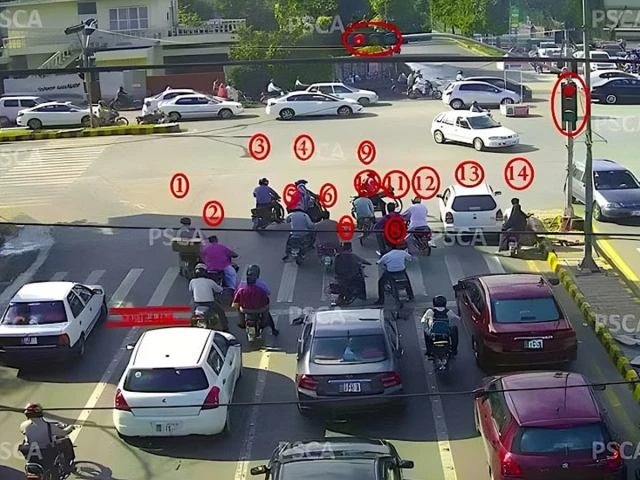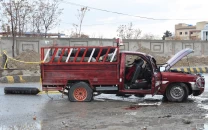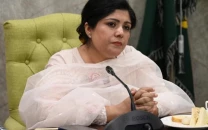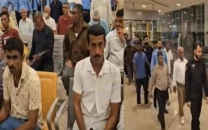TRACS under fire
Citizens, parties reject 'anti-Karachi' traffic system

The Sindh government's newly launched Traffic Regulation and Citation System (TRACS) has drawn widespread criticism from citizens, experts, and opposition parties, who claim the system was rushed through without addressing the mega city's deteriorating road conditions, non-functional traffic signals, and lack of basic transport infrastructure.
According to the Chief Minister's House, TRACS came into effect on October 27. The digital system uses CCTV cameras and AI to detect traffic violations, automatically generating e-challans that are sent to violators online. Fines can be paid, appealed, or explained digitally, and first-time offenders are granted a one-time waiver.
More than 200 cameras have so far been installed across the city, with plans to expand the network to 12,000 in later phases. Officials say the system aims to curb reckless driving and instil traffic discipline through digital enforcement.
However, many citizens have voiced anger over what they describe as excessive fines — ranging from Rs5,000 for motorcyclists to Rs100,000 for heavy vehicles — for offences such as speeding, signal-jumping, driving without a licence, or wrong-way driving.
Karachi has more than three million motorcycles and 1.25 million other vehicles, but hundreds of thousands remain unregistered or untransferred. The Excise Department confirmed a surge in vehicle ownership transfers following the system's launch, as people rushed to avoid wrongful penalties.
Rescue officials report that at least 715 people have died and more than 10,000 have been injured in traffic accidents this year, mostly due to speeding and heavy vehicles.
Urban planners and civil society activists have questioned the timing of the rollout. "Out of 150 major intersections, over 40 traffic signals are out of order and 60% of city roads are in disrepair," said urban planner Muhammad Tauheed. "How can you impose AI-based fines when most of the city lacks basic signage or zebra crossings?"
Social welfare expert Dr Nasreen Aslam Shah said administrative flaws were ignored. "Thousands of vehicles are still registered under previous owners, meaning e-challans will reach the wrong people," she added. "The government should have piloted the system before enforcing it."
Transport analyst Prof Dr Nauman Ahmed described TRACS as a component of the larger Safe City Project. "If complemented by proper infrastructure, it can improve discipline and safety," he said.
Ordinary citizens, however, remain unconvinced. "It's unfair to impose heavy fines when roads are broken and traffic jams are routine," said Nadia Sohail, a resident of Rashid Minhas Road. Delivery rider Farooq Khan added, "I earn Rs25,000 a month — a Rs5,000 fine means I'll have to quit my job."
Civil activist Naeem Khan pointed out another loophole: "If a vehicle is sold but not transferred, the e-challan goes to the old owner — this will create chaos."
Political parties have also criticised the system. The Central Muslim League has filed a constitutional petition in the Sindh High Court, challenging what it called "discriminatory" fines. "Why is the same violation fined Rs200 in Lahore but Rs5,000 in Karachi?" asked the party's Karachi president, Ahmed Nadeem Awan.
MQM-P leader Taha Ahmed Khan called TRACS an "anti-Karachi policy," saying, "When our roads look like ruins, how can the government impose a Dubai-style digital traffic system?"
Jamaat-e-Islami's Mohammad Farooq vowed legal and street protests, while PTI MPA Wajid Hussain said the fines would "cripple thousands of young gig workers who earn less than Rs30,000 a month."
Defending the initiative, Sindh Labour Minister Saeed Ghani said the system was meant to "save lives, not penalise citizens." He added, "If people follow traffic laws, they won't face fines. Karachi needs discipline to reduce deadly accidents."
According to Traffic Police data, more than 15,000 e-challans have been issued since the launch, with about 4,000 generated daily. Citizens can check and pay fines online or via mobile application.
While the Sindh government maintains that TRACS is transparent and efficient, experts caution that without urgent investment in road repairs, functional signals, and public awareness, the ambitious digital system may fail to deliver sustainable results.























COMMENTS
Comments are moderated and generally will be posted if they are on-topic and not abusive.
For more information, please see our Comments FAQ